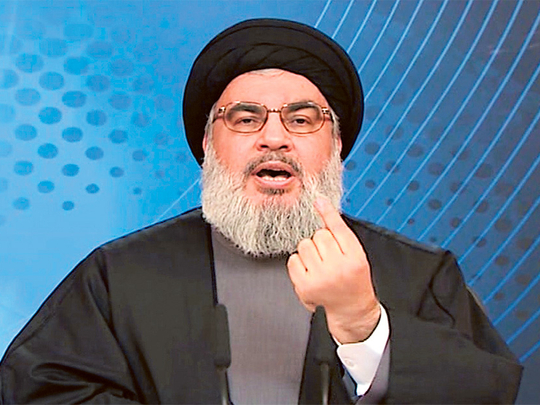
Beirut/Riyadh: The waspish cartoon in a Saudi-owned newspaper summed up the anger behind Riyadh’s decision to cancel billions of dollars in military aid and suspend decades of engagement in Lebanon’s fraught politics.
“The State of Lebanon: April Fool”, it read.
Published on the same day that a Saudi-owned television news channel shut down its Lebanese operations, Friday’s cartoon was the latest sign of a falling out which began in January and has become increasingly embittered.
The cartoon’s stinging message, that the Lebanese government is a fictitious joke, reflects Saudi Arabia’s conviction that the Hezbollah militia, backed by Riyadh’s regional rival Iran, now pulls the strings in Beirut.
The Saudi response was cutting $3 billion (Dh11.02 billion) in military aid and another $1 billion to the security services,
The Saudi action in February was triggered by Lebanon’s failure to join other Arab governments in condemning attacks three months ago on the Saudi embassy in Tehran.
The early release from a Lebanese jail of a former minister, convicted of smuggling explosives in a plot allegedly supported by the Iranian-allied Syrian authorities, suggested to Riyadh that Lebanon’s judiciary was also now beholden to its enemies.
Saudi Arabia spearheaded efforts to get Gulf Arab states and the Arab League to designate Hezbollah a terrorist organisation,
which led to reports of Lebanese being forced to leave Gulf countries because of alleged Hezbollah links.
Lebanon says it is unable to confirm any expulsions, but politicians in Beirut are taking the reports seriously.
What troubles Saudi Arabia is “a militia that is classified as a terrorist group is now hijacking measures in government”, Saudi Foreign Minister Adel Al Jubeir said last month.
Beyond that, Saudi Arabia believes Hezbollah also projects power — and Iranian influence — well beyond Lebanon’s borders.
The group has fought for President Bashar Al Assad in Syria’s five-year conflict and Riyadh has accused it of intervention as far afield as Yemen on Saudi Arabia’s southern border, accusations Hezbollah denies.
Saudi Arabia’s shift signalled a retreat from a long history of powerbroking in Lebanon.
The kingdom hosted peace talks which ended Lebanon’s 1975-1990 civil war and, in the post-war years when violence largely subsided but rivalries festered, it supported the March 14 coalition.
Six years ago, then-King Abdullah Bin Abdul Aziz of Saudi Arabia visited Beirut to defuse a crisis between March 14 and their March 8 rivals, including Hezbollah, which threatened renewed conflict.
Directly or indirectly, through the billionaire businessman and former prime minister Sa’ad Al Hariri and his assassinated father Rafik, Riyadh also channelled hundreds of millions of dollars to its allies in Lebanon. The Hariri family owns a major Saudi construction firm, Saudi Oger.
Viewed from the Gulf, the kingdom’s actions reflect a rational re-evaluation of the diminishing returns on its efforts in Lebanon, frustration with its increasingly impotent Lebanese allies, and strategic priorities which placed the country well below Syria, Yemen and Iraq in a turbulent Middle East.
“The grant [to Lebanon’s army] was based on the assumption that it would strengthen state institutions and allow them to challenge non-state institutions. This was not happening,” said Mustafa Al Ani, a security analyst with close ties to Riyadh’s Interior Ministry.
“They were convinced Hezbollah hijacked the Lebanese state.”
Supporters say Hezbollah’s involvement in Syria has limited the spillover of fighting into Lebanon. Opponents accuse it of fuelling sectarian violence in the country, violence which led Gulf states to warn their nationals against travel to Lebanon long before the recent campaign against Hezbollah.
The percentage of Gulf visitors to Lebanon has halved since 2009, said Nassib Ghobril, chief economist at Lebanon’s Byblos Bank. Gulf investment has dropped off and Gulf Arabs have been selling their Beirut homes, he said.
“Obviously Lebanon needs to repair its relationship with the Gulf Cooperation Council — it’s a lifeline of our economy,” Ghobril said.
Rami Khouri, an academic at the American University of Beirut, did not rule out future rapprochement, but that appears distant for now.
Friday’s announcement that the television channel Al Arabiya was closing down in Beirut left 27 employees out of work. And hours after Asharq Al Awsat’s cartoon was published, protesters broke into its Beirut offices.












